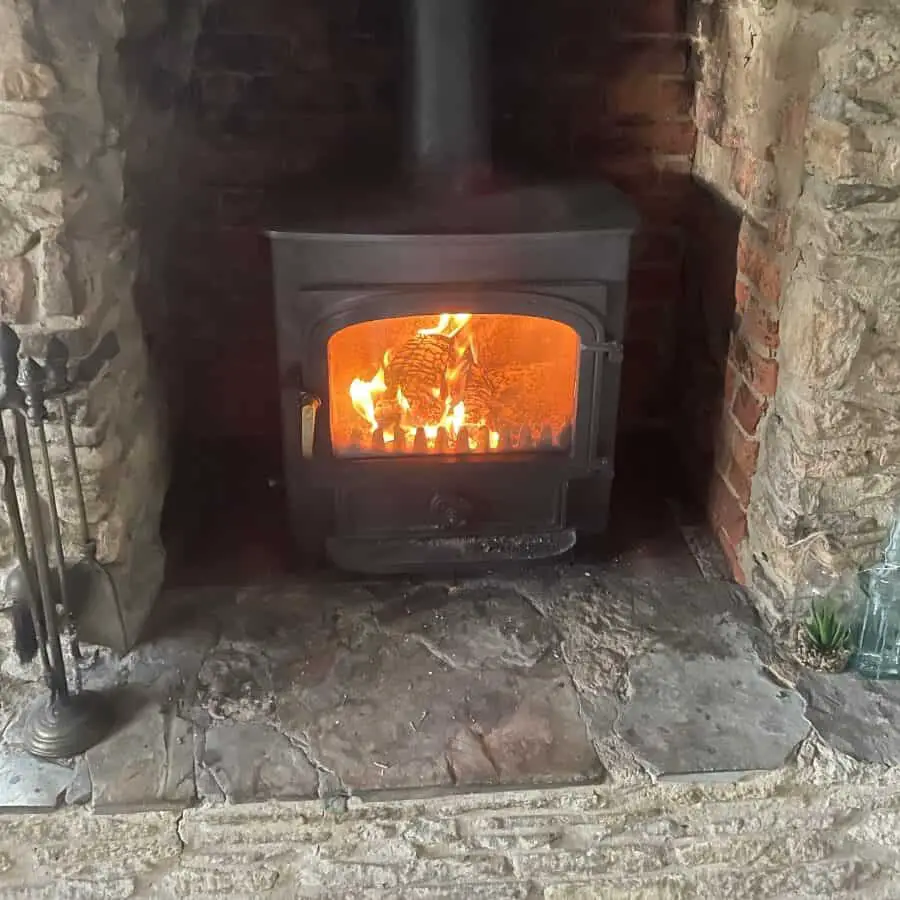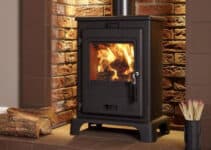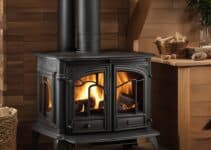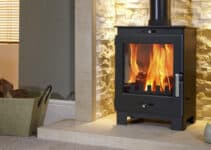In the heart of a British winter, homeowners across the United Kingdom grapple with the choice between traditional heating methods and more contemporary options.
There is a rising popularity of log burners amidst climbing energy costs. The benefits of log burners are touted for their cost-efficiency and eco-friendly credentials, offering a charm and warmth that is hard to replicate.
On the other hand, the advantages of central heating should not be overlooked, with its promise of consistent warmth and convenience.
As we delve deeper, we’ll explore which system: log burner vs central heating provides the better solution for heating our homes.
Understanding Heating Options for Your Home
As a conscientious homeowner in the UK, staying abreast of the dynamic world of heating solutions is a must, especially with the chilling winds of rising energy costs sweeping through our budgets.
The current state of energy prices
My readers would attest that we are witnesses to unprecedentedly high gas and electricity costs. Spiralling prices are pinching our pockets every year. With energy tariffs climbing, the quest for more energy-efficient and cost-effective heating options has taken on unprecedented urgency, urging us to weigh the merits of comparing log burners and central heating.
Central heating – a consistent choice for homeowners
Indeed, central heating has long been a beacon of comfort for many, a reliable mainstay in British homes. Its widespread adoption is indicative of the consistency and ease of use that central heating systems, with their array of boilers and heat pumps, provide.
Yet, the steady hum of these units is growing sour as our bills swell with the vagaries of the energy market. It’s this financial pressure that’s stirring an interest in alternatives like log burners that arguably tip the scales in favour of reduced operational expenses.
This discussion inevitably leads us to examine the energy efficiency of log burners vs central heating. I plan to meticulously assess the costs and benefits, shedding light on what each option means for your household and our environment.
As we tread through these turbulent economic times, rest assured my analyses will be tailored to help you make the most informed, economical, and eco-sensitive decisions for your domicile.
Is a Log Burner Cheaper Than Central Heating?
When it comes to heating a home in the UK, cost-efficiency is on the forefront of many homeowners’ minds. Analyzing the cost comparison log burners vs central heating presents an opportunity to evaluate which option could lead to greater savings in these times of inflated energy costs.

Detailed Comparison of Cost Efficiency
My analysis of current market data reflects that log burners are approximately 13% more cost-effective to run than traditional gas central heating systems. Notably, this benefit becomes even more pronounced when comparing log burners to electric heating, with log burners costing roughly a third of the price within the current energy price cap framework. The financial advantage of log burners is further emphasised by the efficiency of modern Ecodesign stoves, which perform exceptionally with fewer resources—requiring less wood to generate the same heat levels.
Will a Log Burner Save on Energy Bills?
Without question, the promise of saving on energy bills drives many UK residents to consider log burners as a viable heating source. These stoves, known for their energy efficiency log burners vs central heating, not only create cosy and inviting atmospheres but are also kinder to the wallet over time.
As energy prices continue to soar, the lower operational costs of woodburning stoves can lead to substantial savings, making them an increasingly popular option amidst the national call for more economical and efficient energy consumption for home heating.
Log Burner vs Central Heating Price
Considering the cost comparison between log burners and central heating is vital for UK homeowners eyeing alternative heating methods. Acquiring and fitting a log burner can demand a substantial sum upfront. Nevertheless, the long-term outlay for fuel and upkeep is often more economical when juxtaposed against the incessant costs linked with central heating systems.
The current energy market, with its heightened prices and unpredictability, only bolsters the financial appeal of woodburning stoves, especially when we integrate the impact of increased government subsidies compared to previous years.
My analysis zeroes in on an exhaustive breakdown of expenses associated with both heating solutions. This encompasses the cost of purchase, installation, maintenance, and expected lifespans, providing a clear picture of long-term expenditure.
By delving into these costs, I help disentangle the nuances that play a crucial role in shaping a homeowner’s decision. To aid in this decision-making process, I’ve assembled an in-depth cost comparison table that contrasts the critical financial aspects of both heating types.
| Cost Element | Log Burner | Central Heating |
|---|---|---|
| Initial Purchase & Installation | £1,500 – £3,500* | £2,500 – £4,500* |
| Annual Running Costs | £150 – £600* | £750 – £1,200* |
| Average Lifespan | 10-20 years | 15-25 years |
| Annual Maintenance | £50 – £200 | £100 – £300 |
*Prices vary by region, brand, and current market conditions.
To sum up, while the initial outlay for a log burner might seem daunting, the enduring benefits and lower operational costs present wood burners as an allure for those looking at the bigger picture in terms of home heating economics.
Bearing in mind that government grants and subsidies could further tilt the scales, it’s apparent why log burners are attracting the spotlight amid today’s potent energy pricing landscape.
Benefits of Log Burners for Home Heating
The allure of a cosy fire crackling in the hearth, coupled with the rewards of cost-effective warmth, are just some of the compelling benefits of log burners that UK homeowners are embracing.
As concerns around eco-friendly heating options grow, the adoption of log burners reflects a collective move towards more sustainable living.
Is burning wood cheaper than gas central heating?
Delving into the economics of home heating, the scales tip in favour of log burners, especially when considering the long-term financial benefits. With rising gas tariffs, burning wood emerges not only as a cost-friendly alternative but also as an investment in resilience against fluctuating energy markets.
Eco-friendly and sustainable heating
It’s heartening to see the pendulum swing towards eco-friendly heating options, and wood burners stand out in this domain. Their impressive efficiency rates mean that choosing to install a log burner is not merely a personal gain but a step closer to global sustainability efforts, an initiative I hold in high regard.
| Feature | Log Burner | Gas Central Heating |
|---|---|---|
| Heating Cost | Lower in the long run | Subject to gas price |
| Eco-Impact | Carbon-neutral fuel | Dependent on fossil fuels |
| Efficiency Rate | 75-90% of fuel used | Varies significantly |
| Added Value | Enhances property appeal | Modern convenience |
| Maintenance | Regular cleaning required | Less frequent checks |
Log Burner vs Central Heating Pros and Cons
When it comes to heating my home, the carefully considered advantages and disadvantages of both log burners and central heating systems become the crux of an informed decision. As a British homeowner, it’s pivotal for me to compare the level of control and comfort each option provides, especially amidst the nation’s fluctuating energy prices.
Consistency and Control of Heating
The central heating system stands out for its ability to deliver consistent heat throughout my home. With an advantage of central heating being the thermostat’s precise control over room temperature, areas across my residence can uniformly reach a cosy warmth, which feels particularly satisfying during chilly UK evenings.
Integration with Smart Home Technology
Future-proofing my home with the latest technology is a key consideration. Central heating systems harmonise effortlessly with smart home devices, allowing me to adjust settings remotely, ensuring my home is toasty just as I return from work. This convenience found in comparing log burners and central heating tilts the balance towards the latter with its tech-readiness.
Safety and Maintenance Considerations
Safety and upkeep are crucial elements of home heating systems. While the central heating demands less frequent maintenance, being mindful of annual servicing is still necessary for ensuring efficient operation. Log burners, on the other hand, highlight the romance of a roaring fire but come with the indispensable commitment to regular cleaning and vigilant fire safety practices.
In conclu—I find that both heating systems have their merits. Although my central heating may necessitate a check-up only once a year, it’s the log burner that demands a sturdy storage solution for the wood and a consistent cleaning routine. Ultimately, striking the right balance between ease of use, maintenance, and atmosphere is the key to enjoying the winter months in the UK.
Conclusion
As we navigate the nuances of home heating amidst an evolving energy landscape, I’ve scrutinised the differences and similarities between log burners and central heating. It has become apparent that log burners boast numerous benefits, not least the potential for cost savings, which are particularly resonant in the current energy climate. While the upfront expenditure for a log burner can be substantial, these costs are often mitigated over time by lower overall energy bills, aligning with the growing need to curtail expenditures as the energy crisis persists. Indeed, the financial aspect is a pivotal factor when I consider choosing a heating system for a residence.
Evaluating cost savings when choosing a heating system
Analysing the economic aspect, it’s clear that log burners can outshine central heating in terms of operating expenses. The initial outlay, which at first glance seems daunting, amortises itself through what can become significant energy bill reductions. This positions log burners as a wise investment when evaluating long-term savings against short-term costs. No longer a mere accessory, a log burner serves a practical purpose, assisting households across the UK in better managing their heating finances.
Energy crisis and the shifting preferences towards log burners
With the ongoing energy crisis propelling a change in homeowner preferences, the appeal of log burners has surged. It’s a development driven by necessity as much as by environmental concerns, with more people recognising the eco-conscious nature of log burners. As an environmentally responsible individual, I find the sustainability aspect of using wood as a renewable resource to heat my home highly compelling. This surge in popularity is a testament to the resilience and adaptability of homeowners amid turbulence in the energy market.
Making an informed decision for your household
Ultimately, the decision to opt for a log burner or central heating comes down to personal circumstances, incorporating aesthetics, environmental impact, and compatibility with one’s lifestyle. My pursuit of an informed choice has led me to weigh these factors carefully.
As energy prices continue their unpredictable trajectory, the consistency and eco-friendliness of log burners offer me a sense of stability and a reduced carbon footprint. For anyone in the UK confronting similar decisions, it’s essential to balance these considerations carefully to ensure that your chosen heating system aligns with both your ethical values and practical needs.


